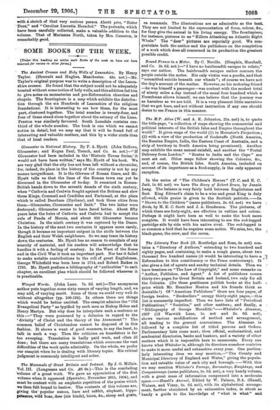Gloucester in National History. By F. A. Hyett. (John Bellows,
Gloucester; and Kegan Paul, Trench, and Co. 4s. net.)—"If Gloucester had been included in the 'Historic Towns Series,' it would not have been written," says Mr. Hyett of his book. We are very glad that the city has not been left without a chronicler, 'for, indeed, its place in the history of the country is not by any means insignificant. It is the Glevum of Roman times, and Mr. Hyett tells us that the lines of the Roman town can yet be discerned in the Gloucester of to-day. It remained in Roman- British hands down to the seventh decade of the sixth century, when " Cuthwin and Cealwin fought against the Britons and slew three Kings, Commail and Condidan and Farinmail, at the place .which is called Deorham (Dyrham), and took three cities from them—Gloucester, Cirencester and Bath." The two latter were destroyed ; Gloucester seems to have fared better. About fifty years later the heirs of Cuthwin and Cealwin had to accept the rule of Panda of Mercia, and about 650 Gloucester became Christian. In the ninth century it was captured by the Danes. In the history of the next two centuries it appears more rarely, though it became an important outpost in the strife between the English and their Welsh neighbours. So we may trace its history down the centuries. Mr. Hyatt has no reason to complain of any 'scarcity of material, and his readers will acknowledge that he handles it with a feeling of mastery. In the Wars of the Roses and in the Civil War it took an important part. Nor has it failed to make notable contributions to the roll of great Englishmen. George Whitefield was born here in 1714, and Robert Raikea in 1735. Mr. Hyett prefixes a bibliography of "authorities" to each chapter, an excellent plan which should be followed wherever it is practicable.


































 Previous page
Previous page